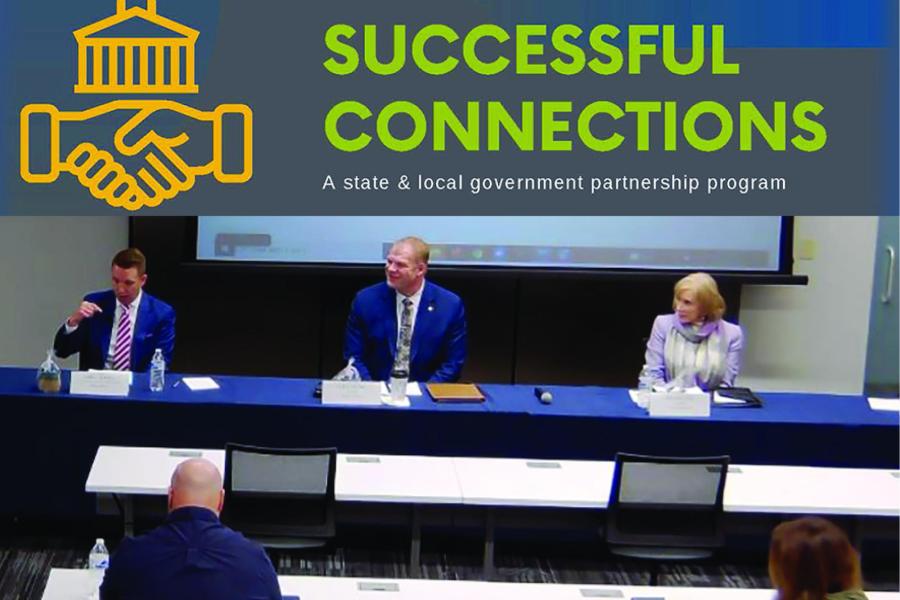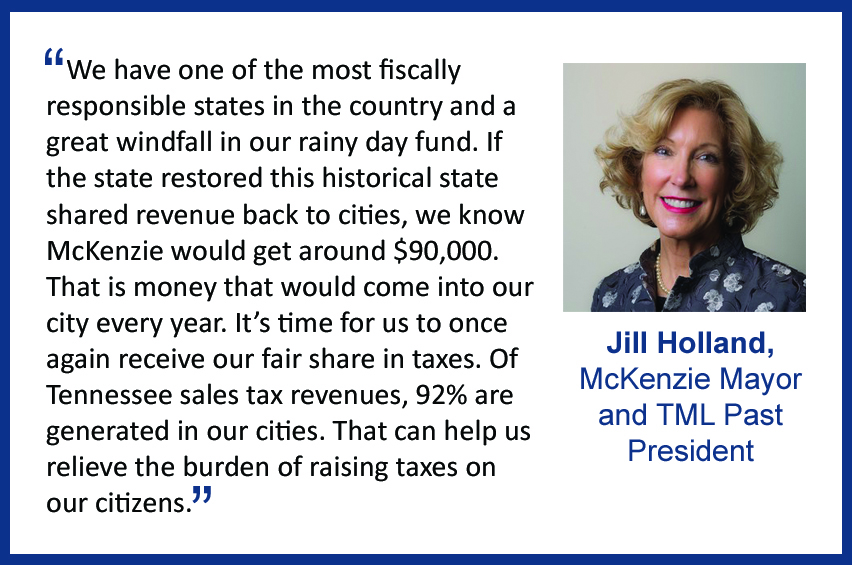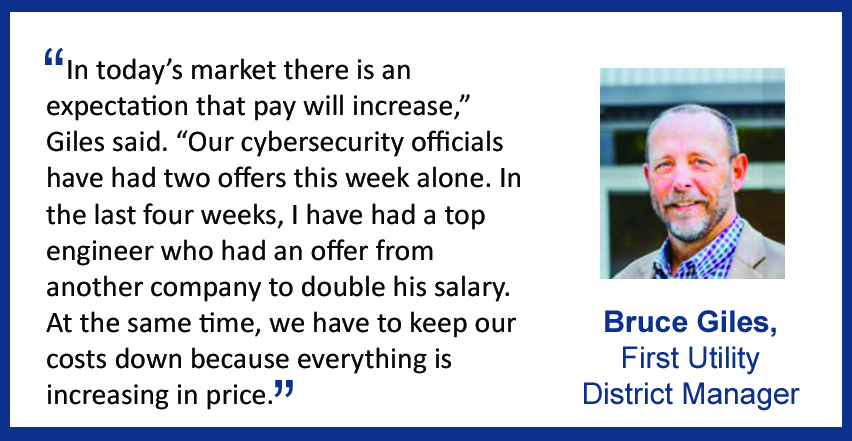Successful Connections meeting focuses on municipal budgets, Great Resignation

By KATE COIL
TML Communications Specialist
Employee retention, providing livable communities, and making infrastructure improvements on a limited budget were some of the topics discussed as part of a series of meetings designed to bring local government officials together to solve common issues.
The first Successful Connections meeting was hosted by the Tennessee State Comptroller’s Office in conjunction with the Municipal Technical Advisory Service (MTAS) and County Technical Advisory Service (CTAS) to bring officials from municipal, county, and state government together along with utility district personnel to address pressing concerns.
Moderated by Knox County CFO/Chief of Staff Chris Caldwell, the panel of the brainstorming session meeting included McKenzie Mayor and TML Past President Jill Holland, Knox County Mayor Glen Jacobs, Tipton County Mayor Jeff Huffman, First Utility District Manager Bruce Giles, and Utility District Commissioner and former Commissioner of the Department of Human Resources Rebecca Hunter.
With the location of Ford’s Blue Oval City in the region, Huffman said he knows many West Tennessee government leaders are struggling to provide services required by the public on budgets that are seeing stagnant or even decreasing revenues.
 “How do you provide urban type services in a rural area that is almost completely an agricultural or greenbelt tax base?” he said. “The fiscal capacity of your tax base is not adequate enough to provide those types of services. We are struggling with a 3,600-acre soy bean field that is now going to be a state-of-the-art equipment manufacturer investing $5.6 billion. We are really wrestling how we are going to afford the infrastructure backbone we are going to need for this economic tsunami ahead.”
“How do you provide urban type services in a rural area that is almost completely an agricultural or greenbelt tax base?” he said. “The fiscal capacity of your tax base is not adequate enough to provide those types of services. We are struggling with a 3,600-acre soy bean field that is now going to be a state-of-the-art equipment manufacturer investing $5.6 billion. We are really wrestling how we are going to afford the infrastructure backbone we are going to need for this economic tsunami ahead.”
Holland said one way local governments are working to help expand tax bases are through SB 2076/HB 2012 – which aims to restore the historic revenue sharing relationship to its 2002 state – and SB 2469/HB 2562 – which will allow local governments to receive a local share of the single article cap tax collections between $1,600 and $3,200.
“We have one of the most fiscally responsible states in the country and a great windfall in our rainy day fund,” Holland said. “If the state restored this historical state shared revenue back to cities, we know McKenzie would get around $90,000. That is money that would come into our city every year. It’s time for us to once again receive our fair share in taxes. Of Tennessee sales tax revenues, 92% are generated in our cities. That can help us relieve the burden of raising taxes on our citizens.”
Working with other government entities to leverage regional projects and pulling in partners like local utility districts, development districts, and groups like MTAS and CTAS are other ways of helping meet financial needs. Hunter said building relationships and sharing resources can be an invaluable way to solve pressing issues.
“It’s important to build a network of relationships, because we learn from each other,” Hunter said. “The public sector can share things in a way the private sector cannot. I’ve never reached out to a fellow colleague in another government entity to ask for help or a program they were using without them saying they would love to share it.”
While grant funding can help deal with infrastructure needs like broadband expansions and meeting infrastructure needs, Huffman said it can be difficult for rural or smaller governments to find someone who can do the full-time job of finding, writing, and applying for the grants and funding programs that can offset financial challenges as well as monitor to ensure the rules of those programs are being followed.
Holland said McKenzie and many other small governments face the issue of having employees who wear multiple hats in city government. Without extra funds to hire more employees, cities may have trouble ensuring separation of duties or finding funds for travel and classes that provide employees with the training or certifications they need. Holland said finding certified codes personnel as well as high turnover in police departments is one issue she has noticed.
 The Great Resignation has meant many governments are struggling to retain essential or senior employees. Limited or stagnated budgets often means that government entities cannot keep pace with the increases in wages, benefits, and quality of life improvements that private industry are making to counteract labor shortages.
The Great Resignation has meant many governments are struggling to retain essential or senior employees. Limited or stagnated budgets often means that government entities cannot keep pace with the increases in wages, benefits, and quality of life improvements that private industry are making to counteract labor shortages.
“Wages are going up,” Huffman said. “Tennessee has always been a low wage state, and that is changing. We aren’t used to that. What concerns me is that the economic is cyclable. I worry about raising wages now and then getting into a period of low growth or no growth where we have a lot of high salaries we have to pay to be competitive but our tax base is not meeting the growth.”
Giles said he has seen employees being offered double what he can afford to pay them to take positions in private industry. When those employees leave to take other jobs, it can then be difficult to recruit new employees who are also more attracted to positions that can provide them more pay or better benefits.
“In today’s market there is an expectation that pay will increase,” Giles said. “Our cybersecurity officials have had two offers this week alone. In the last four weeks, I have had a top engineer who had an offer from another company to double his salary. At the same time, we have to keep our costs down because everything is increasing in price.”
Giles said one thing he has found that has helped retain some employees is adapting to work-life balance changes many employees are now expecting since the pandemic. He said allowing those employees who can to work from home makes those employees more likely to keep their job and that metrics have shown most employees who work from home are much more productive than those in the office.
Hunter said there are several approaches governments can take to keep high-performing employees. One such policy is implementing “stay interviews” to help retain employees rather than relying on “exit interviews” to find out what mistakes were made in the past and correct them.
“You use a stay interview for those employees you know you couldn’t function without them,” Hunter said. “You are going to find you have a lot of employees in that category. One of the first questions you ask is what gets them excited about work and then what makes you dread coming to work every day. You ask what is one thing they would change to make their jobs better. A stay interview gives you a chance to do some reflection. You can see what things you can act on. I have had so many people tell me how much it meant to me that I actually sat down with them.”
Hunter said she once conducted a stay interview with a finance employee she had heard was looking for employment elsewhere. As a result of the interview, Hunter was able to confirm other rumors she was hearing that the employee’s supervisor was creating a difficult work environment. Eventually, that supervisor was let go.
Employee engagement surveys to improve work culture as well as finding what employees are passion about at work are other techniques Hunter said local governments can utilize to improve employee retention and recruitment.
“If we can’t compete with salaries we better be working on the culture,” she said. “We need to have cultures that get people excited. We want people to find their passions, and if they can’t find it with you they need to find it somewhere else. One way you can do this is through an employee engagement survey, but I would warn you not to do one of these surveys if you aren’t going to make changes based on it.”
